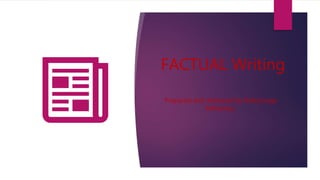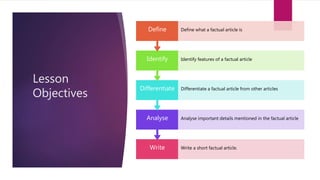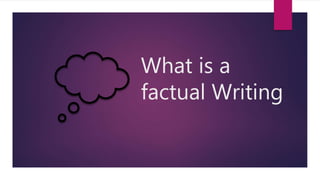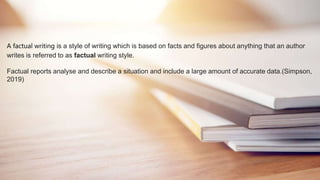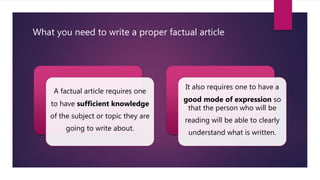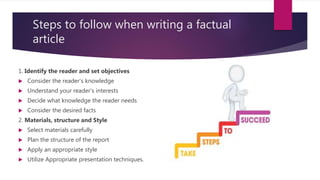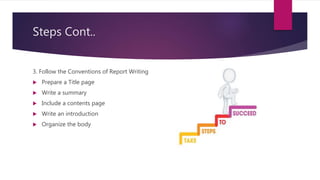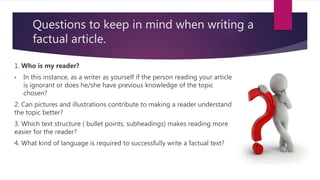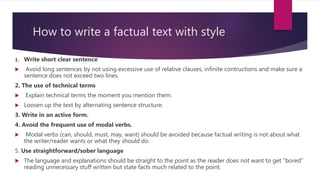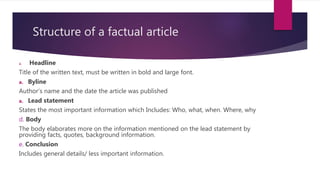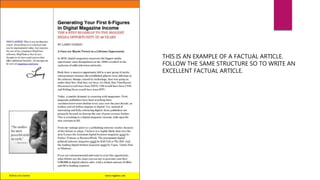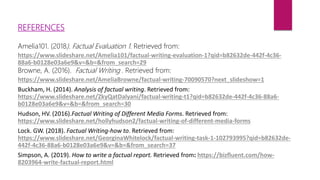Factual writing slides
- 1. FACTUAL Writing Prepared and delivered by Nokulunga Mthembu.
- 2. Lesson Objectives Write Write a short factual article. Analyse Analyse important details mentioned in the factual article Differentiate Differentiate a factual article from other articles Identify Identify features of a factual article Define Define what a factual article is
- 3. What is a factual Writing
- 4. A factual writing is a style of writing which is based on facts and figures about anything that an author writes is referred to as factual writing style. Factual reports analyse and describe a situation and include a large amount of accurate data.(Simpson, 2019)
- 5. What you need to write a proper factual article A factual article requires one to have sufficient knowledge of the subject or topic they are going to write about. It also requires one to have a good mode of expression so that the person who will be reading will be able to clearly understand what is written.
- 6. Steps to follow when writing a factual article 1. Identify the reader and set objectives ïĩ Consider the readerâs knowledge ïĩ Understand your readerâs interests ïĩ Decide what knowledge the reader needs ïĩ Consider the desired facts 2. Materials, structure and Style ïĩ Select materials carefully ïĩ Plan the structure of the report ïĩ Apply an appropriate style ïĩ Utilize Appropriate presentation techniques.
- 7. Steps Cont.. 3. Follow the Conventions of Report Writing ïĩ Prepare a Title page ïĩ Write a summary ïĩ Include a contents page ïĩ Write an introduction ïĩ Organize the body
- 8. Questions to keep in mind when writing a factual article. 1. Who is my reader? âĒ In this instance, as a writer as yourself if the person reading your article is ignorant or does he/she have previous knowledge of the topic chosen? 2. Can pictures and illustrations contribute to making a reader understand the topic better? 3. Which text structure ( bullet points, subheadings) makes reading more easier for the reader? 4. What kind of language is required to successfully write a factual text?
- 9. How to write a factual text with style 1. Write short clear sentence ïĩ Avoid long sentences by not using excessive use of relative clauses, infinite contructions and make sure a sentence does not exceed two lines. 2. The use of technical terms ïĩ Explain technical terms the moment you mention them. ïĩ Loosen up the text by alternating sentence structure. 3. Write in an active form. 4. Avoid the frequent use of modal verbs. ïĩ Modal verbs (can, should, must, may, want) should be avoided because factual writing is not about what the writer/reader wants or what they should do. 5. Use straightforward/sober language ïĩ The language and explanations should be straight to the point as the reader does not want to get âboredâ reading unnecessary stuff written but state facts much related to the point.
- 10. Structure of a factual article a. Headline Title of the written text, must be written in bold and large font. a. Byline Authorâs name and the date the article was published a. Lead statement States the most important information which Includes: Who, what, when. Where, why d. Body The body elaborates more on the information mentioned on the lead statement by providing facts, quotes, background information. e. Conclusion Includes general details/ less important information.
- 11. Before you start writing please consider the steps of the writing process. Step 1: Prewriting Understand what is required of you. Decide on the topic to write about Consider your reader Brainstorm ideas about the topic Step 2: Research Research on your topic and gather facts required Write down your findings and quotes.
- 12. Cont.. Step 3: Drafting âĒ Write the information you researched in your own words âĒ Draftly write sentences âĒ Write everything you want to say about the topic Step 4: Revising âĒ Re-read what you have written âĒ Rearange words, sentences or paragraphs. âĒ Add or take out some parts âĒ Intergrate everything accordingly. âĒ Replace words that are overused or unclear. âĒ Re-read your writing to be sure that it flows.
- 13. Cont.. Step 5: Editing and proofreading âĒ Make sure all sentences are correct and complete. âĒ Correct spelling errors, capitalization and punctuations used. âĒ THEN YOU ARE GOOD TO GO!!!
- 14. THIS IS AN EXAMPLE OF A FACTUAL ARTICLE. FOLLOW THE SAME STRUCTURE SO TO WRITE AN EXCELLENT FACTUAL ARTICLE.
- 15. THANK YOU!
- 16. REFERENCES Amelia101. (2018). Factual Evaluation 1. Retrieved from: /Amelia101/factual-writing-evaluation-1?qid=b82632de-442f-4c36- 88a6-b0128e03a6e9&v=&b=&from_search=29 Browne, A. (2016). Factual Writing . Retrieved from: /AmeliaBrowne/factual-writing-70090570?next_slideshow=1 Buckham, H. (2014). Analysis of factual writing. Retrieved from: /ZkyQatDalyani/factual-writing-t1?qid=b82632de-442f-4c36-88a6- b0128e03a6e9&v=&b=&from_search=30 Hudson, HV. (2016).Factual Writing of Different Media Forms. Retrieved from: /hollyhudson2/factual-writing-of-different-media-forms Lock. GW. (2018). Factual Writing-how to. Retrieved from: /GeorginaWhitelock/factual-writing-task-1-102793995?qid=b82632de- 442f-4c36-88a6-b0128e03a6e9&v=&b=&from_search=37 Simpson, A. (2019). How to write a factual report. Retrieved from: https://bizfluent.com/how- 8203964-write-factual-report.html

